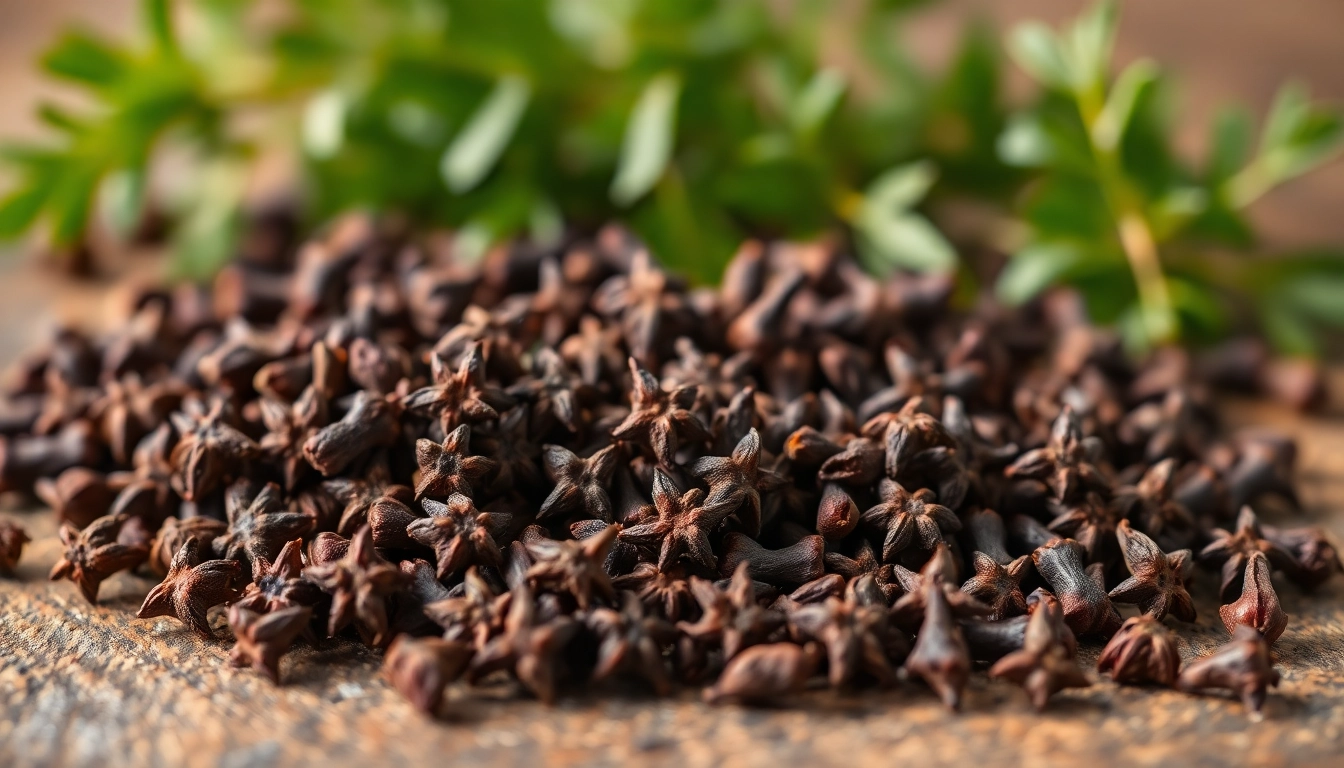Introduction to Cloves
Cloves are often considered one of the most aromatic and versatile spices in the world. These fragrant flower buds, derived from the Syzygium aromaticum tree, are native to the Maluku Islands in Indonesia but are now cultivated in various tropical regions. As an essential ingredient in both culinary and medicinal applications, cloves offer a unique blend of flavors and health benefits that make them indispensable in kitchens and herbal remedies around the globe. In this extensive exploration, we will delve into the origins, nutritional profile, health benefits, culinary uses, and the significance of clove oil and aromatherapy, presenting a comprehensive picture of this small yet powerful spice.
1. What are Cloves?
Cloves are the dried flower buds of the clove tree, which belongs to the Myrtaceae family. They are renowned for their strong, pungent flavor and warm aroma, characterized by a slight sweetness and bitterness. Typically, cloves are harvested when the buds are still immature and have a vibrant, reddish-brown hue. Once dried, they develop a deep color and a flavor that intensifies with exposure to heat.
Used primarily in cooking, cloves are also found in various consumer products, including dental hygiene, soaps, and essential oils. Beyond their culinary and aromatic uses, cloves are celebrated for their medicinal properties, making them a valuable component of traditional medicine practices across various cultures.
2. History and Origin of Cloves
The history of cloves is as rich as their flavor. First used over 2,000 years ago, cloves were prized in ancient civilizations and played a crucial role in global trade. They were one of the main commodities traded along the spice routes of Southeast Asia and were so highly valued that they were often used as currency in trade. The significance of cloves in ancient times is reflected in notable historical accounts, including their mention in Chinese writings dated back to 300 CE and their use in traditional Indian medicine.
The spice gained popularity in Europe during the Middle Ages, believed to have various health benefits and used to mask unpleasant odors—a practice stemming from the clove’s strong aromatic qualities. This led to cloves being regarded as a symbol of wealth and prestige, often reserved for the elite.
3. Nutritional Profile of Cloves
Cloves are not only flavorful but also nutrient-dense. They are rich in vitamins and minerals, including:
- Manganese: Essential for enzyme activity and bone health.
- Vitamin K: Important for blood clotting and bone metabolism.
- Vitamin C: An antioxidant that supports the immune system.
- Fiber: Aids digestive health and promotes gut microbiome balance.
Additionally, cloves contain eugenol, a compound that provides antioxidant properties and contributes to the spice’s health benefits. The overall low-caloric content, combined with the high level of essential oils, makes cloves a nutrient-rich addition to various dishes.
Health Benefits of Cloves
1. Rich in Antioxidants
Antioxidants play a critical role in fighting oxidative stress caused by free radicals, which can lead to chronic diseases, including cancer and heart ailments. Cloves boast an impressive antioxidant profile, primarily due to their high levels of eugenol, which has been shown to neutralize free radicals and reduce inflammation in the body. Moreover, the antioxidant properties of cloves may help protect against cellular damage, supporting overall health.
2. Cloves and Digestive Health
Historically used in traditional medicine, cloves are known to aid digestion. They stimulate the secretion of digestive enzymes, thereby enhancing digestive efficiency and reducing issues like bloating and gas. Cloves may also promote a healthy gut microbiome by balancing intestinal flora, potentially improving conditions such as irritable bowel syndrome and other digestive irregularities.
Incorporating cloves into your diet can be as simple as adding them to your cooking or brewing clove tea, which is known for its soothing effects on the gastrointestinal tract.
3. Cloves for Oral Care
Cloves have long been recognized for their antibacterial properties, making them a popular ingredient in oral hygiene products. The eugenol found in cloves has analgesic and antiseptic benefits, making them effective in relieving toothache and gum inflammation. Many commercial toothpastes now include cloves or clove oil as a natural remedy for bad breath and as a means to promote oral health. Furthermore, chewing on whole cloves can help kill bacteria and freshen your breath naturally.
Culinary Uses of Cloves
1. Incorporating Cloves in Recipes
Cloves can be utilized in a myriad of culinary creations, ranging from sweet to savory dishes. Their distinct flavor pairs well with various ingredients, enhancing the complexity of flavors. Some common culinary applications include:
- Adding whole or ground cloves to spice blends for meats, especially in roasted dishes.
- Incorporating cloves into baked goods, such as gingerbread, cookies, and cakes for a warm, aromatic flavor.
- Using cloves in drinks, particularly in spiced teas and mulled wines, where their robust profile complements other spices.
Experimenting with cloves in diverse recipes can lead to an exciting explosion of flavor and offer guests a unique taste experience.
2. Cloves in Traditional Medicine
Cloves have been embraced in many traditional medicine systems, including Ayurveda and Traditional Chinese Medicine (TCM). In Ayurvedic practices, cloves are utilized for their warming properties, promoting circulation and aiding in relieving respiratory issues, such as coughs and colds. In TCM, cloves are often recommended for digestive disorders and to alleviate gastrointestinal discomfort.
Notably, clove oil, distilled from cloves, is widely used in herbal remedies for treating infections, relieving pain, and easing inflammation. Its application in poultices can offer localized relief from soreness and muscle tension.
3. Unique Flavor Pairings with Cloves
One of the fascinating aspects of culinary practice is the blending of flavors. Cloves pair brilliantly with several spices, herbs, and ingredients, creating a symphony of taste. Some exceptional combinations include:
- Cinnamon: Often paired in sweet dishes like pies and pastries, enhancing warmth.
- Star Anise: Together, they can create a complex flavor profile in Asian cuisine.
- Nutmeg: In beverages, both spices work well to create holiday favorites.
- Citrus: The fresh notes of lemon or orange beautifully contrast with the warmth of cloves.
Experimenting with these combinations can yield delightful culinary discoveries and elevate your dishes beyond the ordinary.
Clove Oil and Aromatherapy
1. Extraction and Uses of Clove Oil
Clove oil is extracted through steam distillation, resulting in a concentrated liquid that carries the potent essence of cloves. The oil is prized for its aromatic qualities and therapeutic properties, widely used in aromatherapy, personal care products, and household cleaning agents. Some of the common uses of clove oil include:
- Incorporating clove oil into homemade cleaning solutions for its antibacterial properties.
- Using it in diffusers or inhalers for its invigorating aroma that helps lift mood.
- Applying diluted clove oil topically to alleviate pain and swelling associated with soreness.
When using clove oil, it is essential to dilute it with a carrier oil to avoid skin irritation.
2. Benefits of Clove Essential Oil
The benefits of clove essential oil extend beyond scent and flavor; it possesses several therapeutic properties, including:
- Anti-inflammatory: Clove oil’s ability to reduce inflammation makes it beneficial for soothing sore muscles and joints.
- Antimicrobial: The power of clove oil against bacteria and fungi enhances its usage in natural cleaning and personal care products.
- Anesthetic: Its analgesic properties can help numb pain when applied to sore areas.
Incorporating clove essential oil into wellness practices can promote overall health and well-being.
3. Safety and Usage Guidelines
While cloves and clove oil are generally safe for most individuals when used appropriately, there are specific guidelines to consider:
- Always perform a patch test before applying clove oil topically to check for allergic reactions.
- Pregnant women should consult healthcare professionals before using clove oil due to its potential effects on the body.
- Use clove oil in moderation, as excessive consumption can lead to digestive discomfort or liver issues.
By following safety guidelines and consulting with healthcare professionals when necessary, you can enjoy the diverse benefits of cloves without adverse effects.
Conclusion and Further Reading
1. Summary of Clove Benefits
In summary, cloves are not merely a flavor enhancer but a powerhouse of health benefits. From their antioxidant properties and support for digestive health to their multifaceted roles in cooking and traditional medicine, cloves hold a valuable place in the pantheon of spices. Incorporating them into your diet can enhance not only the flavor of your meals but also the quality of your health.
2. Research Articles on Cloves
For those interested in delving deeper into the science and research surrounding cloves, numerous studies shed light on their health benefits and applications. Journals in nutrition and herbal medicine often include research articles discussing the pharmacological properties of cloves and their role in health promotion.
3. Where to Buy Quality Cloves
For culinary enthusiasts and health-conscious consumers alike, sourcing quality cloves is essential. Look for organic and sustainably sourced options to ensure the best flavor and health benefits. Specialty spice shops, local markets, and online retailers often provide a selection of whole and ground cloves, along with clove oil, to meet a variety of needs.



